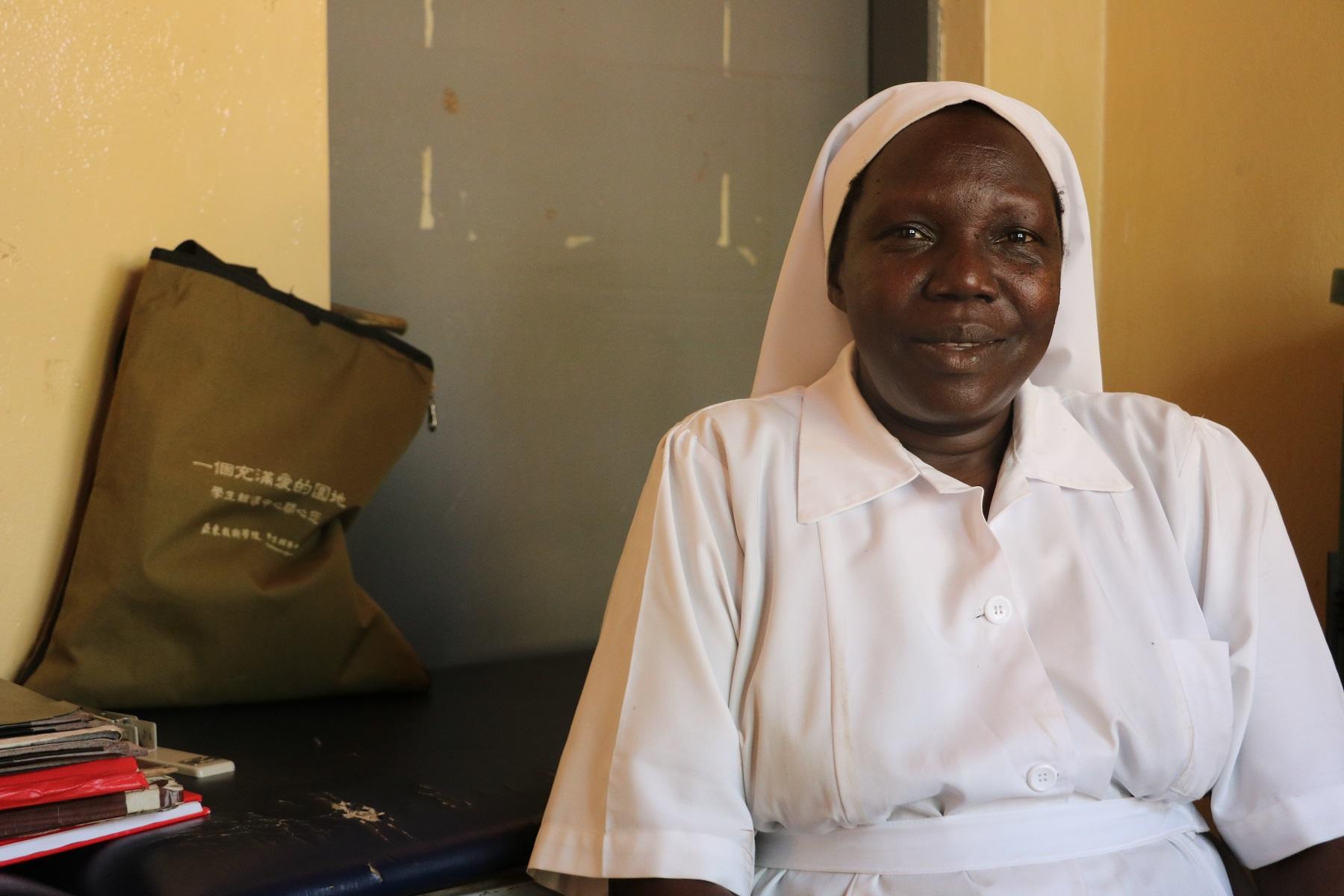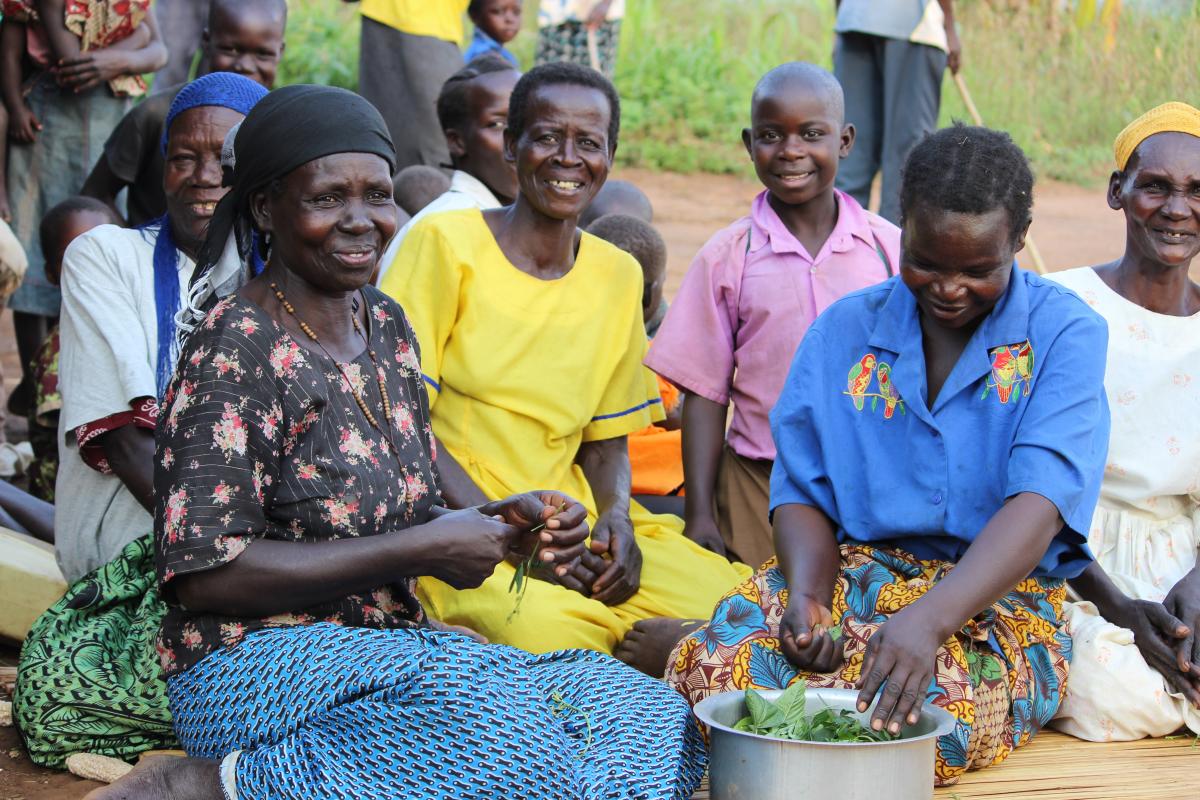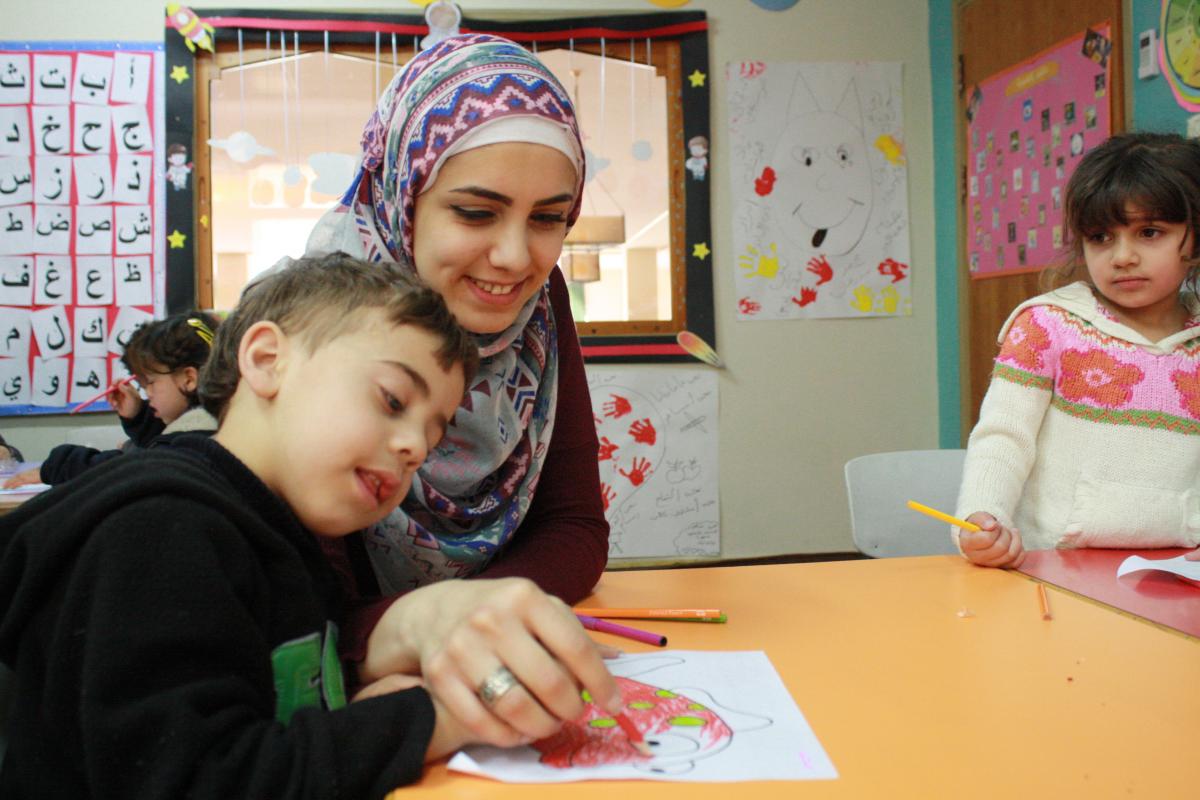Opzoeken
2250 - 2265 van 2520 nieuws bekijken
-

Les génies de la route!
Julie CLAASSENS | 30/03/2017
Voici un portrait des cantonniers qui travaillent à Masi-Manimba, dans la province du Kwilu. Sans eux, la route n'existerait pas...
-
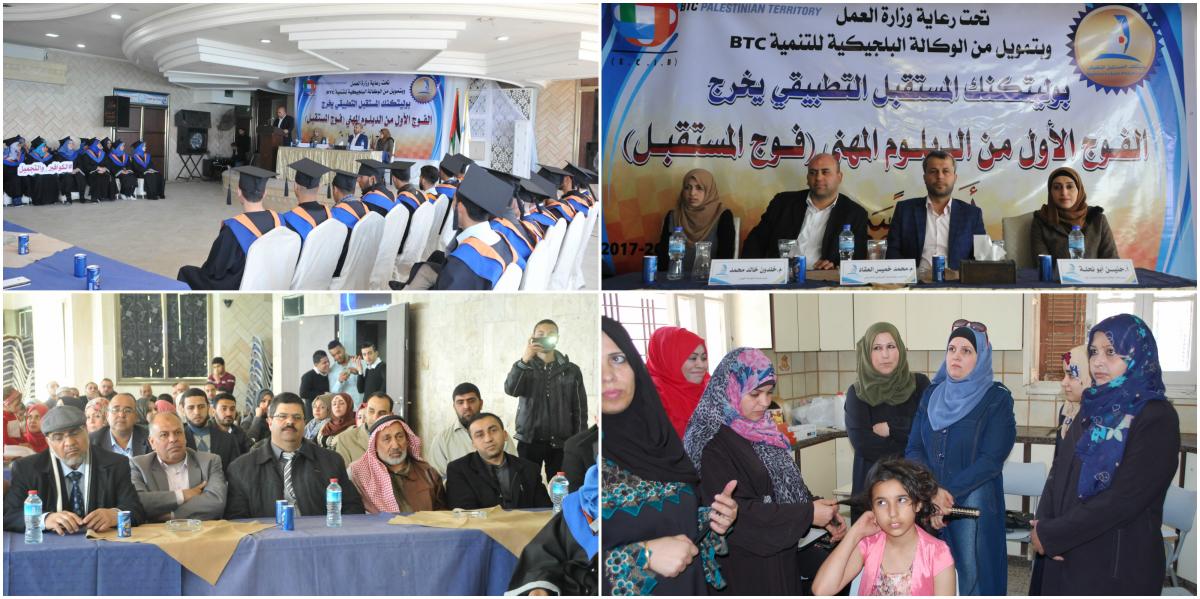
Air Conditioning & Hairdressing: Two Success Stories from Gaza
Laure MOSTINCKX | 30/03/2017
The Applied Future Polytechnic College in the Gaza Strip has completed two Work Based Learning initiatives and celebrated the graduation of 30 students in air conditioning and hairdressing in a high profile event attended by both Jehad Draidi and Said El-Haq, the director generals responsible for TVET and Vocational Education at the Ministry of Education and Higher Education in Palestine. Under the Work-Based Learning scheme funded by the Belgian Development Agency, the students were able to combine college training with practical experience in the private sector for air conditioning and hairdressing respectively. Moreover, through the WBL programme, special funds as well as new tools and equipment could be provided for the students to support them during their studies and prepare them for the labor market. Both the air conditioning and hairdressing initiatives were highly successful, with several graduates already owning their own businesses or working in the sector. Hairdressing, as the newly added vocation in the college, was particularly successful, with already 5 graduates being employed in the private sector.Suzan Al Helo, one of the graduates and mother of 6 children, had a dream to be an active woman and help her husband to improve their living conditions. “I was suffering from a difficult economic situation. After I had children I decided to go to this college. Now I am working in my own hairdressing salon in my home.”
-
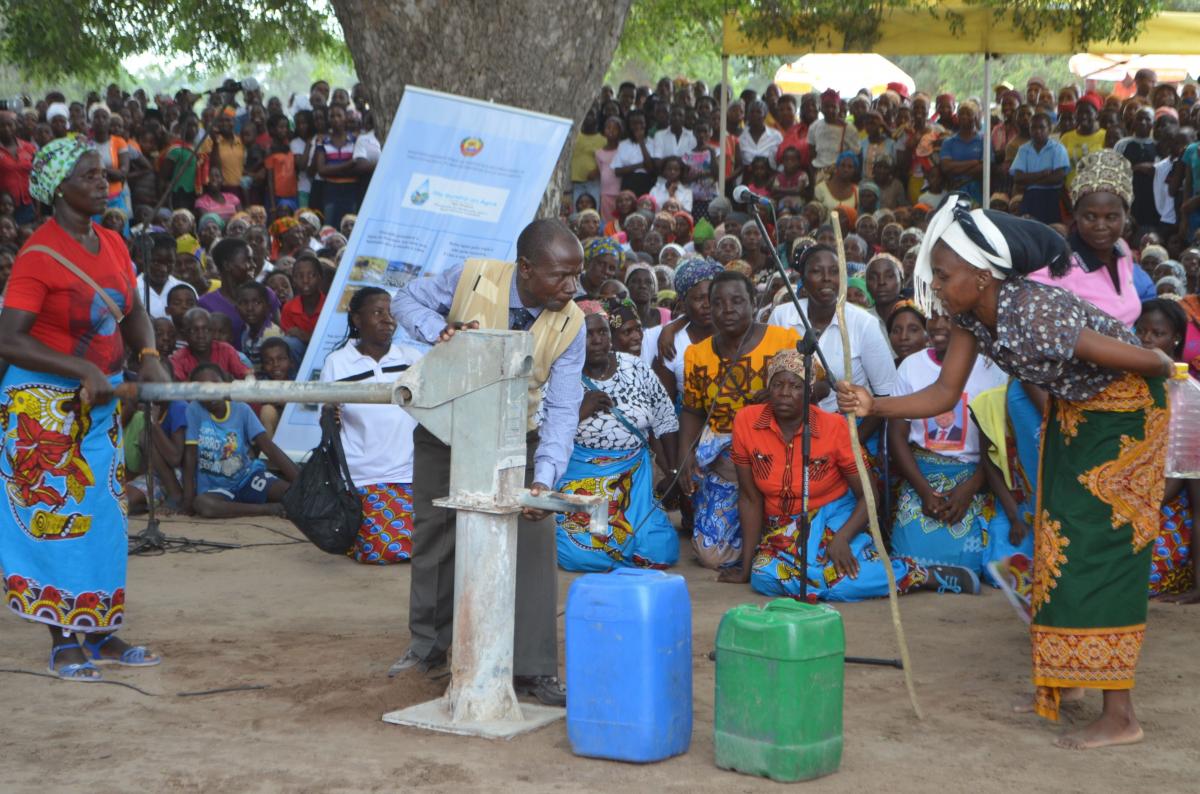
Celebrating water
Anke VANDEVELDE | 29/03/2017
For the occasion of the World Water Day on the 22nd of March, BTC celebrated together with the Governor of Gaza Province, Mrs. Stella Pinto, and the communities of Tomanine and 7 de Abril the official inauguration of the BTC Water Supply and Sanitation Project. The community festivities were preceded by a tour around the premises to demonstrate the accomplishments of the project. Since 2013, BTC is successfully working on different solutions to improve water access in these remote areas and to better the quality of salty and unsafe water. For instance, BTC opted to move away from the manual pumps to install electric pumps which brings the water closer to the population through the construction of elevated water tanks and a water supply network that goes into the target villages. Where the installation of electric pumps and taps were less feasible, the innovative method of a flexible tank provides water in remote places, which is filled by trucks passing by to pick up goods. Furthermore, new water detection techniques allow to assess the quality and saltiness of the water in boreholes. As demonstrated by Governor Pinto and BTC officials, the water provided by the 130 community taps and 4 public fountains is drinkable and safe, accessible at all times and in close proximity to the houses of the local beneficiaries. After the official inauguration of the water supply system, the community members invited Governor Pinto and the BTC officials to celebrate World Water Day and the success of the BTC project. The ceremony was highly attended by the residents and included performances by various community groups: young school children sang about World Water Day, high school students presented an act about the importance of drinkable water and women praised the access to water. A women’s group performed a play to demonstrate their life before and after the new water supply system and applauded the comfort of the new water carriers, “the Q-drums”, which enables young and old to draw the carrier instead of lifting the buckets. In her speech, Resident Representative of BTC Mozambique, Mrs. Laurence Janssens, expressed her appreciation to the Ministry of Public Works, Housing and Water Resources, the Government of the District and Province, as well as to BTC colleagues and the communities for their hard work and support. She called on them to continue their efforts, as to guarantee the sustainability of the new water supply system. Furthermore, the Resident Representative emphasized that BTC will remain active in the region with the construction of solar pumping systems in the districts of Massangena, Mabalane and Chigubo and with the implementation of desalination projects. Mrs. Stella Pinto, Governor of Gaza Province, welcomed and thanked the communities and BTC officials for their presence on the inauguration and the celebration of World Water Day. She expressed her gratitude towards BTC and the partners in providing the communities with drinkable water, applauded the progress made by BTC in the last year and counts on the partners to continue their support. Finally, Governor Pinto called upon the community members to use the water rationally, considering the impact of climate change, as well as to take care of the infrastructure in order to ensure that funds go to the construction of new water pumps instead of reparations. For the around 9000 residents of these communities this project implies a significant improvement of the quality of life, as it will reduce health problems related to drinking saline water, facilitate stable access to drinkable water and ensure food and nutrition security. Within the scope of the project, access to drinkable water has already been established for 18.000 people and more than 21% of the rural population (46.000 people) in the districts of Northern Gaza are expected to benefit from the BTC project. Due to its extensive experience in improving access to water in rural Mozambique, BTC has been praised for its innovative approach and has received much appreciation from the local population and the Mozambican partners, including President Filipe Nyusi.
-
Invest in good community health workers
Thea MATHUES | 28/03/2017
Sister Martina has been working in Saint-Francis Health Facility III, Arua district, for almost 10 years. A midwife by training she is very motivated to bring quality health care to her community. We spoke to her about the challenges the facility faces, her love for the job, and the changes she has seen over the years. « Even though work is not always easy I still love my job. »I’ve been here since 2007. So almost 10 years now. I should really celebrate! Before coming here I used to work in Lira,Saint-John hospital. The difference between the two facilities very big. In Lira we were supported by many ngo’s and we had a very big HIV centre. Here we are situated in a place where we really needed to convince the population of the importance of health. People are just trying to cope in thispeasant community Before this health centre came in 2001 people died of preventable diseases. Especially in the beginning it was hard to convince people to come in when they were sick.StigmaEven today it can create problems because of the stigma connected to some diseases. We recently had a gentleman who tested positively for HIV. In the beginning he was taking his drugs, but after a while he stopped. He got sicker and sicker and only returned to our health centre when it was too late. He died last week.Fortunately some improvement has been made.The sisters who founded this health centre also trained people in the community to become health assistants and nurses. This helped establish a relationship with the community.Thanks to PNFP project and result-based financing we have been able to reduce our fees. This has made health care more accessible for the community. Still not all people can afford it. People here depend heavily on farming for their income but recently we have had a shortage of rain. This means people have no income and no money for health.Proud of my jobEven though work is not always easy I still love my job.There is no better feeling than being able to help someone. When you can help someone come out of despair, that is just wonderful. God can do his work through us and through me. As a human being I’m able to help another human being return to his everyday life.Big DreamsI hope this facility can be converted into a health centre 4. If we offer more services people might believe more in the work we are doing. Now they get discouraged when they are referred to another hospital because we cannot handle the case. A lot of people cannot afford this, some don’t even have the money for transport.People are also afraid to die in an unknown place. hey even say: ‘why do you want us to die in some strange place?”. I realize it will take more than just better equipped facility to convince people. We really need good community health workers. They should coordinate with community leaders, religious leaders and local political leaders. Everyone needs to come together.
-
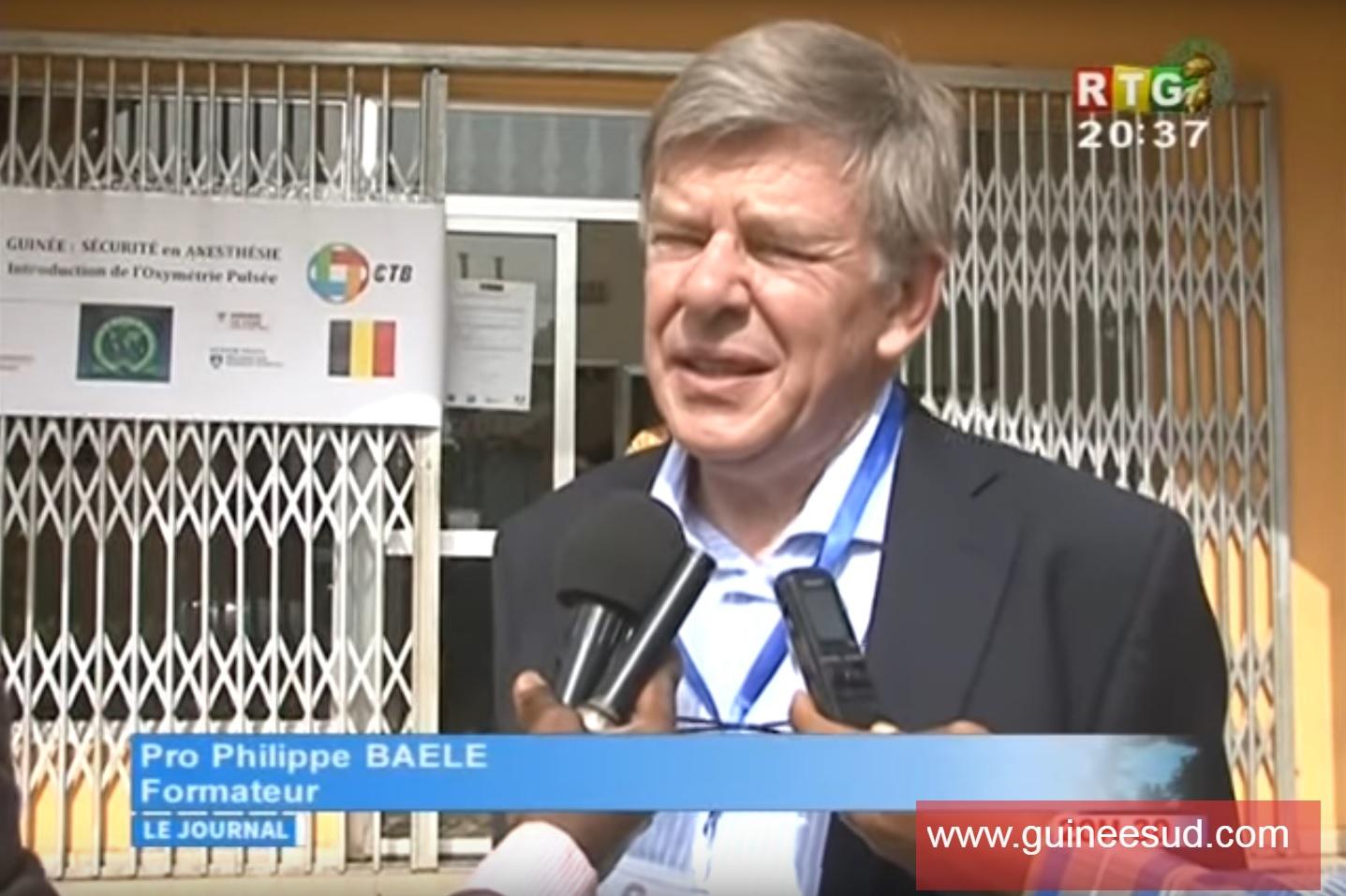
Une formation des anesthésistes à Conakry
Els DEHANTSCHUTTER | 24/03/2017
Le Projet de Renforcement des Capacités par le biais de Bourses, d’Etudes et d’Expertises (RCBEE) en Guinée, avait déjà démarré ses activités de formations et d’études par le secteur portuaire dès fin 2016. Au niveau de la Santé, une première action de formation locale vient de se dérouler à Conakry. Il s’agit d’un atelier qui a regroupé plus d’une soixantaine de médecins anesthésistes et d’infirmiers faisant fonction d’anesthésistes en provenance de toutes les structures hospitalières de Guinée. Cet atelier de 3 jours sur « L’introduction à l’Oxymétrie Pulsée » a été animé par des spécialistes Belge, Béninois et Burkinabe, avec la participation du Projet LIFEBOX de la World Federation of Societies of Anaesthesiologists (WFSA) qui a fourni gratuitement une cinquantaine de pulse-oxymètres (pour mesurer la quantité d’oxygène dans le sang). Après la formation tous les participants ont exprimé leur satisfaction et ont affirmé qu’ils avaient acquis des compétences qui vont sensiblement relever la sécurité des patients dans les salles d’opération de leurs hôpitaux. La formation était dans la presse guinéenne: presse https://www.youtube.com/watch?list=PLrtGSrufH5tAPHQTvw6P7zMuFwmPCOQv8&v=Qp6ihLDfvzg
-

Le bac de Bagata
Julie CLAASSENS | 24/03/2017
Regardez ce petit film afin de découvrir l'importance des bacs fluviaux pour la population en RDC.
-
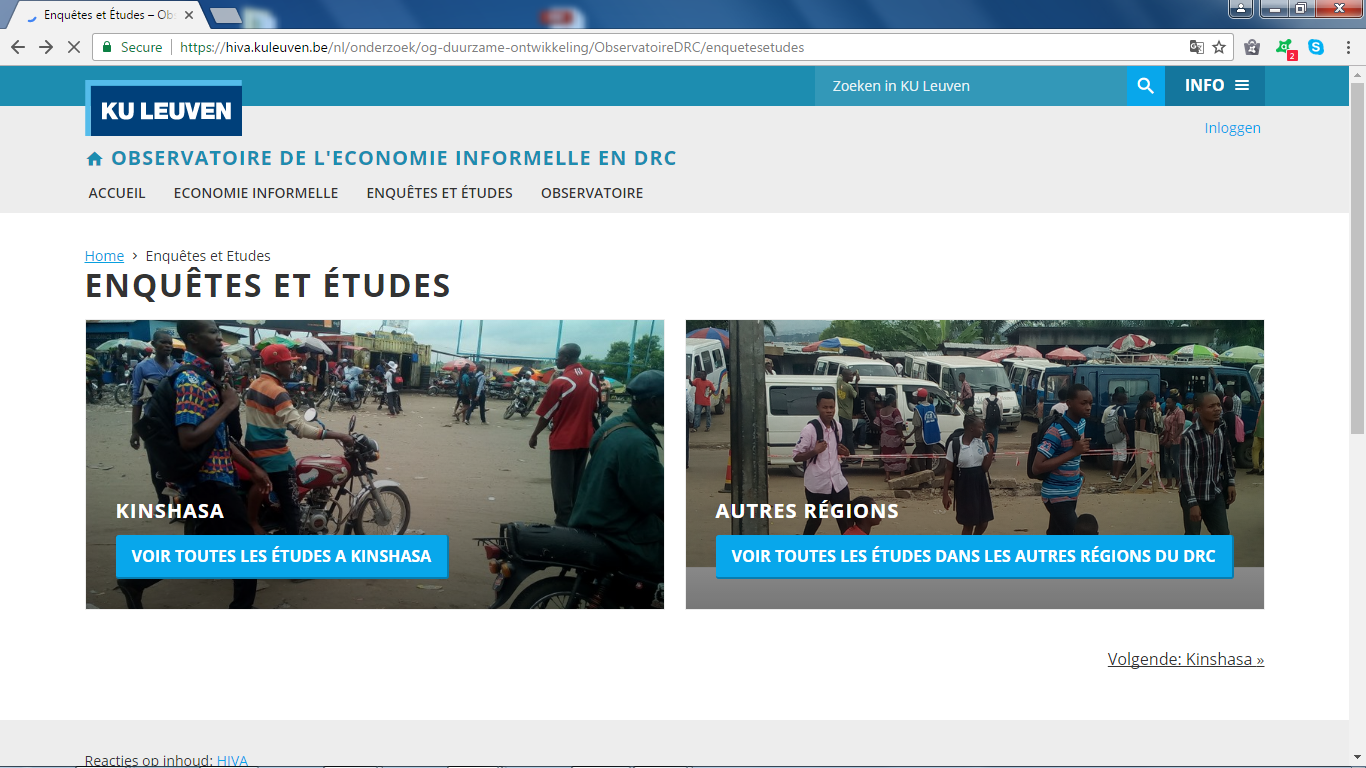
Mise en place d’un observatoire et d’un site web pour l’économie informelle en RDC.
Julie CLAASSENS | 23/03/2017
La restitution de l’observatoire sur l’économie informelle a eu lieu hier à Kinshasa. L’économie informelle est l’ensemble d’activités de production des biens et services pratiquées par des individus ou des organisations mais très peu ou pas du tout enregistrées et moins réglementées. En République Démocratique du Congo, plus de quatre-vingt pour cent de la population active travaille dans ce secteur qui est composé principalement des coiffeurs, cordonniers, réparateurs des pneus, laveurs de véhicules, chargeurs d'automobiles, marchands ambulants, tailleurs, ajusteurs, vendeurs des produits pétroliers, cireurs, boutiquiers, vendeurs de produits médicaux traditionnels, etc. Il s’avère cependant que les différentes structures aussi bien étatiques que privées potentiellement intéressées par ce secteur n’en disposent pas d’informations suffisantes pour leurs actions.Eu égard à ce qui précède, le Programme d’Etudes et d'Expertises a mis à la disposition du Centre de Dynamique Sociale de l’Université de Kinshasa le financement nécessaire pour la production d’un corpus de connaissances sur ce domaine. L’étude s’est étalée sur six mois et est réalisée en collaboration avec l’institut de recherche sur le travail et la société HIVA de l’Université de Louvain.Ici, plusieurs résultats ont été obtenus à des questions variées, entre autres: les conditions de travail dans ce secteur, les domaines d’activités les plus touchés, les risques auxquels sont soumis les pratiquants, le sexe ratio dans chacun des domaines, les relations avec les structures étatiques notamment le payement des taxes, l’accès au financement, le mode d’épargne, etc.A l’issue de cette étude, un observatoire de l’économie informelle a été mis en place et un site web a été créé pour cela. Ces outils constituent une source d’informations accessible pour les acteurs voulant intervenir dans ce secteur. Considérant que la connaissance est un préalable à la tranformation, l’accès aux l’informations sur ce secteur constituera une source d’inspiration pour des politiques publiques et des actions d’ONG visant l’amélioration des conditions de la population et enclenchera un processus de transformation du secteur informel vers le formel. Des études similaires sont envisagées dans d’autres provinces de la RDC considérant des changements profonds du même fait qui peuvent exister selon les provinces et les régions.
-

Launch of the EU project for Refugees in Northern Uganda
Josephine OMUNYIDDE | 23/03/2017
The Support Programme for Refugee Settlements and Host Communities in Northern Uganda (SPRS-NU) funded by the European Union Emergency Trust Fund (EUTF) and aimed at supporting aspects of stability contribute to better migration management as well as addressing the root causes of destabilization, forced displacement and irregular migration in the Horn of Africa. SPRS-NU is a 3-year programme implemented through three components: (i) Water and sanitation (WASH) component, managed by the Austrian Development Agency (ADA); (ii) Skills development & entrepreneurship training, managed by the Belgian Technical Cooperation (BTC) Agency; and (iii) the Livelihoods, Conflict Management, Educational and Knowledge components, managed by a NGO Consortium, led by the Danish Refugee Council (DRC) consisting of the Save the Children, ZOA & CEFORD. This programme is in line with the Refugee and Host Population Empowerment (Re-HOPE) strategy and adheres to the Comprehensive Refugee Response Framework (CRRF). This involvement also underlines the EU's commitment to work closely not only with Government of the Republic of Uganda, but also with other development partners. By doing so, effective, sustainable and coordinated programmes for the benefit of both host communities and refugees in Northern Uganda are ensured.
-
Support programme for refugee settlements and host communities in northern Uganda to improve food security, nutrition and livelihoods
Josephine OMUNYIDDE | 23/03/2017
In a celebratory mood, small crowds of women, men and youth walk towards Mungula primary school in Mungula 1 Refugee Settlement, one of the already established camps in Adjumani district built to accommodate over 30,000 refugees in northern Uganda, just across the border from South Sudan. The occasion to which the crowd proceeds, is the launch of the Support Programme for Refugee Settlements and Host Communities in Northern Uganda (SPRS-NU) funded by the European Union Emergency Trust Fund (EUTF) and aimed at supporting aspects of stability, contribute to better migration management as well as addressing the root causes of destabilization, forced displacement and irregular migration in the Horn of Africa. The SPRS-NU inauguration happens at a time of the rapidly expanding refugee influx in neighboring Uganda as a result of growing turmoil in South Sudan. The current civil war in South Sudan began in December 2013. Although it was triggered by disagreements within the government, its roots are historical and relate to the failure to create inclusive modes of governance in the newly independent country.According to the UNHCR statistics (30th January 2017), of the 692,613 South Sudan refugees in Uganda, 64% are children below the age of 18 while 86% of this population are women and children whose critical needs must be addressed as a human right. The critical needs of these refugees after settlement include enhanced livelihoods, provision of safe water and environmental sanitation conditions, skills for labor market relevance, conflict management and accelerated learning among others that are funded in this project by the EUTF to promote resilience, economic and equal opportunities, security and development and addressing human rights’ abuses. In the presence of over 2,000 refugees and host communities, Hon. Hilary Onek and the European Union (EU) Head of Cooperation in Uganda, Michelle Labeeu, inaugurated the 10 million euro SPRS-NU project with planting of trees at Mungula 1 refugee settlement in Itirikwa sub-county.On this occasion, Minister Onek and the Head of Cooperation at the EU Delegation to Uganda, Ms. Michelle Labeeu, planted trees in commemoration of the inauguration of the SPRS-NU. The Ambassador of Belgium, Mr. Hugo Verbist, and the Head of Austrian Development Agency, Mr. Günter Engelits, also planted trees alongside refugees and host community members to signify a dignified co-existence of refugees and host communities in the refugee districts of northern Uganda including Adjumani, Arua and Kiryandongo. The SPRS-NU is in line with the Refugee and Host Population Empowerment (Re-HOPE) strategy and adheres to the Comprehensive Refugee Response Framework (CRRF). This involvement also underlines the EU's commitment to work closely not only with Government of the Republic of Uganda, but also with other development partners for effective, sustainable and coordinated programmes for the benefit of both host communities and refugees in Northern Uganda. Officiating as Guest of Honor, Minister Onek noted that Uganda has on its soil almost one million refugees and more than 85% of the refugees currently arriving in Uganda are women and children under the age of 18 who lack access to proper shelter, food and health facilities, among other basic necessities. In her address during the launch of the programme, Ms. Michelle Labeeu commended Uganda’s exemplary hospitality and progressive refugee policies and added that "Uganda is not alone. Uganda can keep counting on the European Union's support for handling such a challenging endeavor." In furtherance, Ms. Labeeu announced the decision of the European Union to add further 10 million euro to the programme allowing to expand interventions to other effected districts. SPRS-NU is a three-year programme implemented through three components: (i) Water and sanitation (WASH) component, managed by the Austrian Development Agency (ADA); (ii) Skills development & entrepreneurship training, managed by the Belgian Development Agency (BTC); and (iii) the Livelihoods, Conflict Management, Educational and Knowledge components, managed by a NGO Consortium, led by the Danish Refugee Council (DRC) consisting of the Save the Children, ZOA & CEFORD.
-

La vie à Kibimi
Julie CLAASSENS | 21/03/2017
Papa Jérôme Vanga Ndinga raconte comment la vie quotidienne dans son village a changé, grâce à la réhabilitation de la route entre Bandundu et Bagata.
-

La cité Karavia, un portrait.
Julie CLAASSENS | 21/03/2017
A Lubumbashi, dans la cité Karavia, le projet PRELUB installe une nouvelle ligne basse tension afin d'améliorer la qualité et d'augmenter la quantité de la fourniture d'énergie éléctrique. Le film ci-dessus montre comment les habitants de la cité vivent actuellement, sans un courant stable et fiable.
-

L'avenir est féminin, aussi au Congo!
Julie CLAASSENS | 21/03/2017
Regardez Rachel et Eliane, qui suivent la formation en électrique à l'Institut Technique Industriel Vyombo. Après une petite réticence de sa mère, Rachel s'est décidée de suivre son coeur quand-même. Eliane est fille unique et ses parents la soutiennent 200%. L'Institut Vyombo est une des écoles les plus connues dans l'ex province Katanga, soutenu par EDUKAT.
-
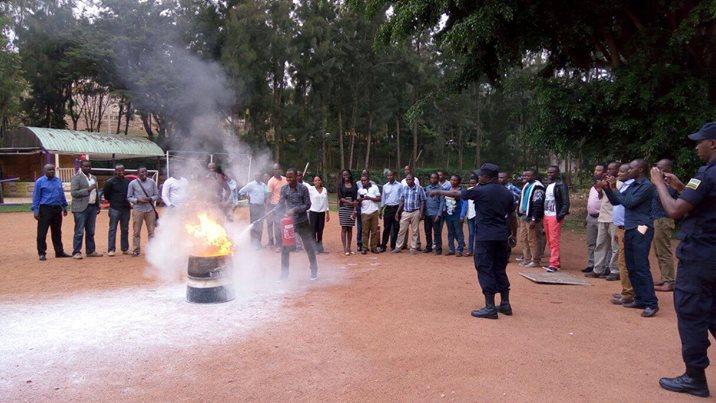
Fire safety management trainings to increase the safety of health facilities
Alexis DE HERDE | 20/03/2017
Through “Ubuzima Burambye” Health Programme, BTC Rwanda - in close partnership with the Ministry of Health - wants to strengthen the quality of primary health care and health services in Rwanda. One of the expected results of the programme is to set up a functional quality assurance system at the level of all hospitals. It includes fire prevention and fire safety management. The Ministry of Health is mandated to oversee the quality and safety in all health facilities in Rwanda. It has been observed by the Ministry that some health facilities, were encountered by fire outbreak and there was no fire safety management in place. In this context, the Ministry of Health in collaboration with Rwanda National Police have developed fire safety training programme, focusing on health facilities to ensure safety of healthcare providers, patients, public and infrastructure. Supported by BTC, a first set of theoretical and practical "training for trainers" took place in Kigali. The newly formed trainers are coming from different health facilities in the country. They have acquired basic skills, knowledge and abilities on fire safety management and are now able to develop fire safety program and plans for preparedness. In collaboration with the Ministry of Health and the National Police, they will guide, inspect and evaluate fire risks in the health facilities. Appropriate measures will be taken if needed. The trainer’s next mission is now to train staff on fire safety management within the health facilities. This is a crucial step for making Rwandan health facilities comply with national and international accreditation criteria on fire prevention.
-
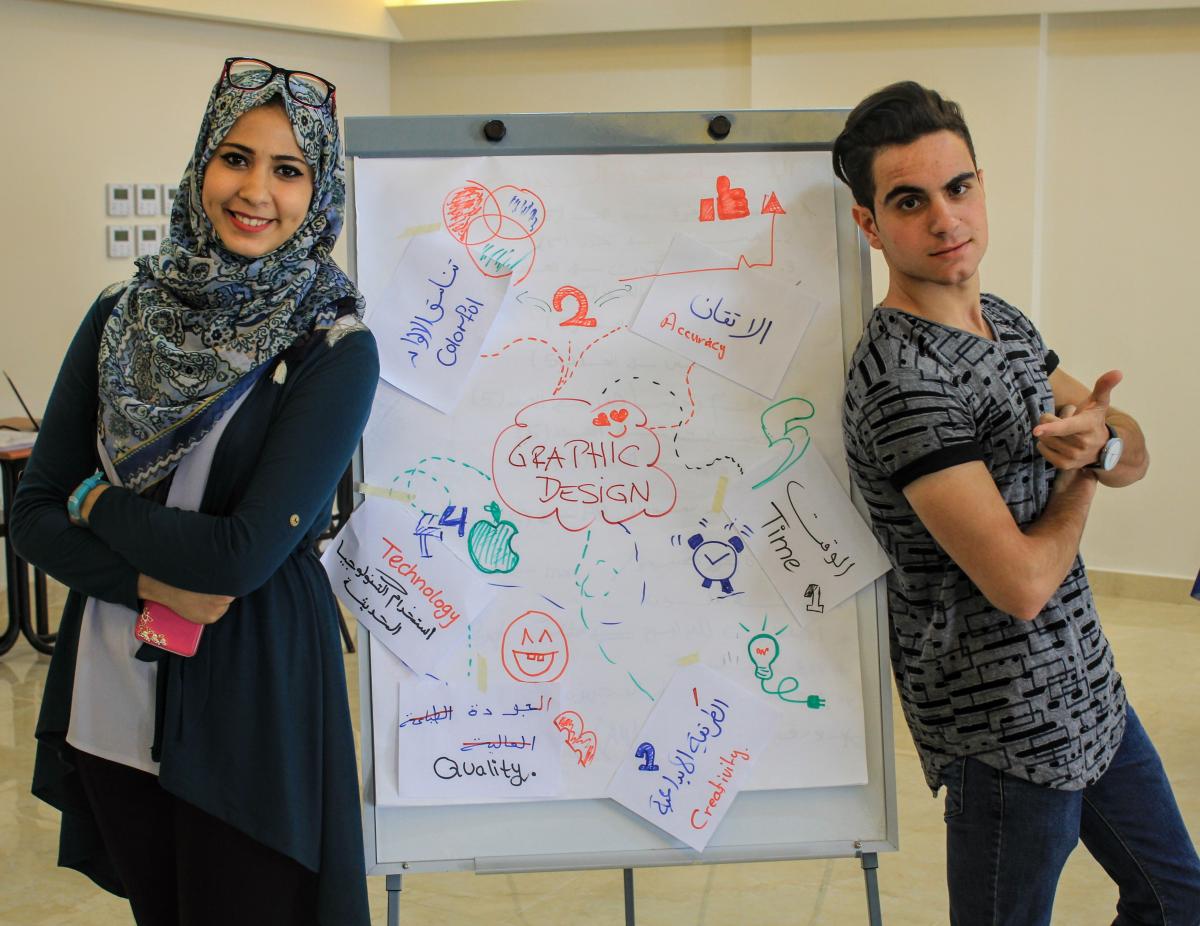
Belgium supports first Palestinian Worldskills delegation ever
Guido COUCK | 20/03/2017
WorldSkills is the largest vocational skills competition in the world. It is aimed at raising interest for vocational training, showcasing excellence in some 50 different domains as diverse as pastry making, painting, graphic design etcetera.This year WorldSkills takes place in Abu Dhabi from 14 to 19 October; young people from 75 countries will take part in the skills competition. For the Palestinian youth it is the first time they have the opportunity to participate. Sobheya Abumusallam is a 21-year old graphic designer from Nablus. She won the silver medal at the first PalestineSkills National Competition. Ibraheem Qawasma is a 20-year old graphic designer from Hebron. Ibraheem won the gold medal at the first PalestineSkills National Competition. As part of their preparation for the WorldSkills competition, Belgian experts are mentoring Sobheya and Ibraheem and the other members of the Palestinian graphic design delegation."In the past, it wasn’t considered appropriate for Palestinian women to become graphic designers, but slowly this mentality is changing, and international competitions like WorldSkills strengthen this process," says Sobheya. Youth unemployment is very high in Palestine. Vocational training has proven to be one of the most successful ways of tackling this issue. That is why the Belgian cooperation focuses its efforts on support to technical and vocational education and training centres. As part of this cooperation, the Palestinian delegation of students and experts in graphic design that will compete in Abu Dhabi, is travelling to Belgium from 17 to 31 March. Recognising the importance of this cooperation, the Palestinian representation in Belgium has invited the students and the local experts to discuss this issue. During their time in Belgium, they will meet with representatives of Belgian training centres (Syntra and IFAPME). They will also compete in the Startech’s Days, the Belgian national WorldSkills competition, taking place in Brussels on 20-21 March, as a preparation for the international WorldSkills competition later this year in Abu Dhabi. Afterwards (22-31 March) they will get a tailor-made training from the Belgian expert from the Centre de competence Forem Cepegra in Charleroi.
-
6 young Palestinians dealing with children with special needs
Eva MORRE | 20/03/2017
Under the Work Based Learning scheme of the Belgian Development Agency, students from vocational and technical training centra and schools can combine their training in these institutions with a practical training in the private sector. This is likely to drastically enhance their chances to find a job afterwards. Also some of the students from the Al-Rawdah technical community college have participated in a Work Based Learning initiative. A group of six young Palestinian female students studying Child Education have been enrolled in the scheme. They have been able to participate in an internship at the Special Education School of the Palestinian Red Crescent Society, a school that focuses on the care of children with special needs. They were trained in different fields: (i) hearing and language disorders, (ii) motor disorders and (iii) special education and autism. All of the students considered this internship a very interesting practical training and have therefore enrolled as a volunteer at the Future Youth Organization where they are now assisting the head teachers in classes of 20 to 25 children aged 5 to 7 years old. One of the students, Saba’a, has been very touched by the improvement of the behaviour of one of the children in school: “Nassim is an aggressive and hyperactive child that was always shouting and hitting other kids. I have tried to build up a bridge of confidence. After observing his behaviour for several days, I realised he needs more warmth and encouragement to play with the other kids in a non-violent manner. I have cooperated with his mother as well on his behaviour. It has touched me a lot that he started calling me by my name, and even wanted to come and visit me in my hometown of Qalqilia. Honestly, the Work Based Learning initiative has enriched my experience and has helped me to face children with special needs with a positive spirit.”
